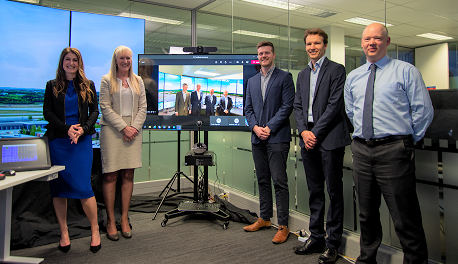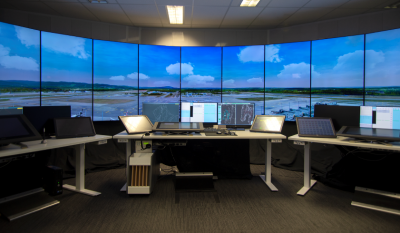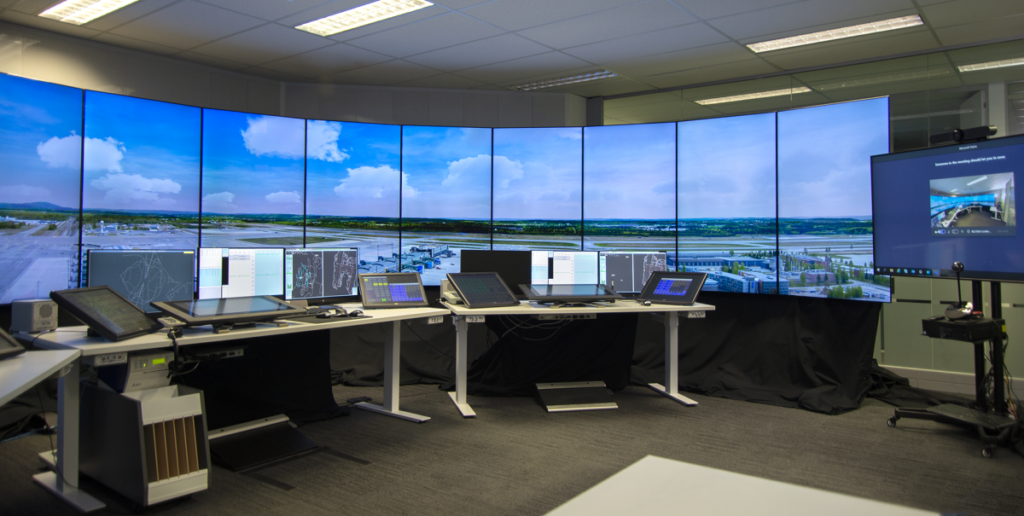Home News & updates Customer story/case study Customer story: Avinor ANS Simulation Project
Innovative use of technology and a creative approach to delivery was required to complete a complex eight-month project to install a suite of TotalControl simulators across 12 sites throughout Norway.
Avinor Air Navigation Services is a wholly-owned state limited company under the Norwegian Ministry of Transport and Communications, and is responsible for 44 state-owned airports.
In April 2020 Airways International Ltd (AIL) signed a contract with Avinor to install six large tower cabs (four with dedicated surveillance sims), six mobile simulators and 17 aerodrome environments at 12 sites throughout Norway. The project also included a five-year contract for simulator licence, support and maintenance.
With the Airways and Avinor teams working thousands of kilometres apart during the eight-month project, and with travel and border restrictions in place due to Covid-19, an agile approach and close collaboration was key.
The project’s scale along with the tight timeframe was already a challenge. Overlaying Covid-19 border and travel restrictions created the right opportunity to adapt a reasonably standard sim commissioning process to be more dynamic, efficient and flexible, which increased feedback loops and collaboration between AIL and Avinor.

Following the immense challenges facing AIL as a result of Covid-19 border and travel restrictions, the business needed to reinvent the way it designed, deployed and delivered its air traffic control simulators globally.
As Covid-19 swept its way around the world creating global havoc in early 2020, the AIL team quickly kicked into gear and started to put its Covid-19 mitigation plan into place for the Avinor project – the first simulator delivery and installation project post Covid-19 for the team.
Creative use of cloud-based technology enabled factory acceptance testing to be delivered from New Zealand, with the team from Avinor participating from Norway. AIL’s simulator specialists guided Avinor technicians through the installation of hardware, and simulator user training was delivered remotely via the Airways Knowledge Online (AKO) virtual academy. Site acceptance testing was led by Avinor in Norway, with seamless engagement by AIL staff remotely.
The Oslo Airport simulator installation on 1 October 2020 was the first TotalControl simulator to be installed remotely by AIL – believed to be the first remote installation and site acceptance testing of a simulator internationally. The final tower simulator went live at Stavanger Airport in Sola on 16 December 2020. All remaining aerodrome environments were then built and commissioned to conclude the project.
Location:
12 Simulator sites throughout Norway
Sim types and positions:
Aerodrome environments:

The COVID-19 situation has provided the aviation industry with many challenges indeed. It is great to see that we have been able to overcome these challenges together, by implementing new technology using digital solutions and a great sense of ingenuity – despite being located on opposite sides of the planet.
Anders Kirsebom
CEO, Avinor Air Navigation Services
The success of the Avinor ANS remote simulator installation and commissioning project has opened the door to a new approach to simulator deliveries, as the world recovers from the impacts of Covid-19.
Empowering customers to take ownership of hardware procurement and installation, supported by world-class training and support, has numerous benefits for both the customer and AIL as a supplier.
These benefits include a smaller carbon footprint; cost savings through locally procured hardware; reduction of travel; a higher level of engagement from onsite end users through increased involvement in the installation phase; and reduced delivery timelines as shipping and travel bottlenecks are removed.

TotalControl advanced simulation combines unparalleled photo-real graphics with an easy-to-use, intuitive interface – bringing you one of the most realistic digital simulation platforms on the global market.